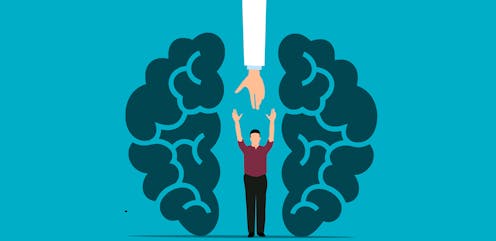Expansion of marriage rights to same-sex couples also expanded access to the psychological benefits that come with tying the knot
- Written by Alana L. Riso, Ph.D. Student in Clinical Psychology, Binghamton University, State University of New York

Marriage and the ability to start a family are human rights[1]. Ten years ago, on June 26, 2015, the U.S. Supreme Court’s decision in the Obergefell v. Hodges case extended the right[2] to marry to same-sex couples.
With 7.6%[3] of Americans identifying as LGBTQ+, this decision continues to have an impact beyond legal benefits.
Marriage provides unique advantages – a reality we have come to know as psychology researchers[4] who focus on couples[5]. The right to marry allowed same-sex couples the opportunity to experience these advantages.
Benefits of a healthy marriage
Although evidence largely comes from different-sex couples, psychology research documents the numerous benefits healthy marriage confers on well-being. Married people experience more positive emotions[6]. They also have many physical health[7] advantages, such as being more likely to survive cancer[8] or major surgery[9]. Children of married couples[10] seem to benefit as well.
A healthy marriage brings benefits that are distinct even from what couples in long-term relationships experience. Those who are married have better psychological well-being[11], such as less depression[12] and better physical health[13] than people in nonmarital romantic relationships, even those who live with their partner[14].
Not surprisingly, the benefits of being married do not extend to unhappy marriages[15]. The effects of marriage on physical well-being, life satisfaction, depression and mental health more broadly depend on marital quality[16], and so do outcomes for children[17].
What’s so special about marriage?
What makes a happy marriage different from a happy cohabiting, stable relationship when it comes to well-being? Social scientists don’t know, but there are a few theories.
The one with the most empirical support involves a concept from physics called inertia[18]. Applied in relationship science, inertia describes the idea that a relationship will remain the same or continue moving along the same trajectory unless some outside force acts upon it.
As relationships progress, they naturally gain momentum. Partners invest more into their relationship over time. They exchange gifts, meet each others’ friends, and start staying at each others’ homes. Eventually, a natural step in this progression is either cohabitation or marriage.
Marriage is a milestone, marking a new stage in life. Deciding to get married is a long-term commitment that often takes years of planning. Cohabitation, on the other hand, is easy to slide into[19] due to the forward trajectory of a relationship. Cohabitors tend to stay together less as an intentional choice but for convenience.
The intentional lifelong commitment of marriage may explain why it offers more benefits[20] than cohabitation.
10 years of same-sex marriage
As more same-sex couples have married, are they seeing the same marriage benefits that other-sex couples always had? Research on the topic is only just beginning. Still, there is some preliminary evidence that they are.
In a 2024 survey[22], respondents with same-sex spouses largely felt closer to their partner and more satisfied with life in general after getting married. Findings from one research study indicate that married same-sex couples see greater benefits to psychological well-being[23] than do same-sex couples in registered domestic partnerships. Another study on same-sex relationships found that marriage was linked to greater happiness and fewer depression symptoms[24] than cohabitation.
As for children of same-sex parents, they do just as well[25] as those with other-sex parents. There’s not much data yet on the impact on kids of same-sex parents divorcing.
Do marriage benefits differ for same-sex couples?
The happiness of same- and other-sex relationships is largely determined by the same factors[26], but there are two key differences: gender composition of the couple and stress from discrimination.
In other-sex relationships, women tend to fall into subordinate positions[27]. Same-sex couples are free from traditional male-female gender dynamics, allowing more of a balance of power. For instance, they have a more even division of household chores[28], and partners have a more equal say when resolving conflicts[29]. Greater equality may improve the quality of same-sex relationships.
The other distinguishing feature of same-sex couples is that their relationships are negatively affected[30] by discrimination, a known stressor[31]. In research done mostly on different-sex couples, even support from a partner does not ameliorate[32] the downstream effects of discrimination and – as is the case with other stressors[33] – can make relationship problems seem worse[34].
Societal disapproval may lead someone to internalize negative ideas about their own sexuality and relationship. In other words, buying into society’s message that one’s relationship is morally wrong harms their own mental health[35] and consequently their relationship[36]. Psychology researchers theorize that societal disapproval is a key factor[37] standing in the way of same-sex couples experiencing the full benefits of marriage.
More societal acceptance post-Obergefell
As an increasing number of U.S. states, and eventually the federal government, legalized same-sex marriage, greater societal acceptance has followed[38]. In 2025, 67% of LGBTQ+ adults agree that the country has become more accepting[39] of same-sex couples due to the legalization of same-sex marriage.
This trend is not unique to the U.S. Around the world, countries where same-sex marriage is legal tend to have a higher percentage of the population say they favor same-sex marriage[40]. Although the causal direction is opaque, evidence from multiple countries indicates that same-sex marriage bans reinforce nonacceptance[41] of LGBTQ+ people, while legal recognition fosters societal approval. Acceptance lowers stress[42] for same-sex couples, allowing them to enjoy the benefits of marriage.
Although societal acceptance in the United States has improved dramatically[43] over the past couple of decades, it is important to note that 19% of Americans[44] still strongly oppose same-sex marriage. Legalization was a major step, but it has by no means eliminated discrimination altogether.
References
- ^ human rights (www.un.org)
- ^ extended the right (sgp.fas.org)
- ^ 7.6% (news.gallup.com)
- ^ psychology researchers (orcid.org)
- ^ who focus on couples (scholar.google.com)
- ^ more positive emotions (doi.org)
- ^ physical health (doi.org)
- ^ survive cancer (doi.org)
- ^ major surgery (doi.org)
- ^ Children of married couples (doi.org)
- ^ better psychological well-being (doi.org)
- ^ less depression (doi.org)
- ^ better physical health (doi.org)
- ^ even those who live with their partner (doi.org)
- ^ do not extend to unhappy marriages (doi.org)
- ^ marital quality (doi.org)
- ^ children (doi.org)
- ^ inertia (www.britannica.com)
- ^ easy to slide into (doi.org)
- ^ more benefits (doi.org)
- ^ Justin Sullivan via Getty Images (www.gettyimages.com)
- ^ 2024 survey (williamsinstitute.law.ucla.edu)
- ^ psychological well-being (doi.org)
- ^ greater happiness and fewer depression symptoms (doi.org)
- ^ just as well (doi.org)
- ^ determined by the same factors (doi.org)
- ^ subordinate positions (doi.org)
- ^ household chores (doi.org)
- ^ resolving conflicts (doi.org)
- ^ negatively affected (doi.org)
- ^ known stressor (doi.org)
- ^ does not ameliorate (doi.org)
- ^ stressors (doi.org)
- ^ make relationship problems seem worse (doi.org)
- ^ mental health (doi.org)
- ^ relationship (doi.org)
- ^ societal disapproval is a key factor (doi.org)
- ^ societal acceptance has followed (www.pewresearch.org)
- ^ become more accepting (www.pewresearch.org)
- ^ favor same-sex marriage (www.pewresearch.org)
- ^ reinforce nonacceptance (doi.org)
- ^ Acceptance lowers stress (doi.org)
- ^ improved dramatically (www.pewresearch.org)
- ^ 19% of Americans (www.pewresearch.org)
Authors: Alana L. Riso, Ph.D. Student in Clinical Psychology, Binghamton University, State University of New York




